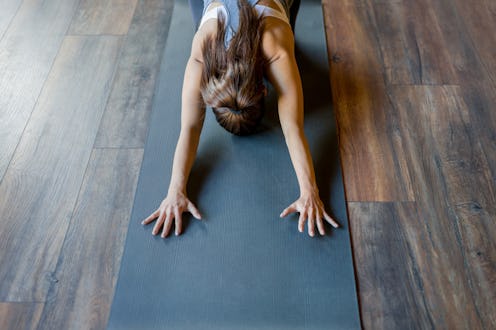Health
Here’s Why Your Muscles Hurt When You’re Anxious
Did you run a 5K, or is it your fight or flight reflex talking?

You feel like you’ve run a 5K, but you haven’t been off your couch in a week. Every time you think about it, your jaw is clenched. And come to think of it, things at work have been a little stressful lately. Experts tell Bustle that muscle pains are a common result of anxiety, whether they pop up after a panic attack or just linger in your neck, shoulders or elsewhere.
“When we’re feeling anxious or scared, our muscles tense up in preparation for our bodies to respond to a real or perceived threat,” Mark Debus MSW LSCW, behavioral health team lead at claims management company Sedgwick, tells Bustle. This is part of the “fight or flight” response, where your body gears up to battle for your life or flee to safety. “Our heart races, breathing quickens, and blood is shunted from nonessential areas such as the stomach and intestines to parts of the body that will increase our chances of survival, like our legs and arms,” Michael Richardson M.D., a physician at medical provider One Medical, tells Bustle. The muscles also tense, in case you need to spring into action.
This reaction is involuntary, and very ancient — the fight or flight system evolved thousands of years ago in order to save people from saber-tooth tigers. But you may feel these symptoms whenever your anxiety flares up.
A fight-or-flight episode can make your muscles tighten in place. “If we hold this tension too long, our muscles get sore,” Debus says. “This is what you see a lot of the time in people who are experiencing elevated levels of anxiety or who have been through a trauma.” Even if you haven’t done anything physical in the moment, your body has clenched, ready to fly — and that build-up can really hurt.
Once the hectic panic of a fight-or-flight episode is over, you might feel muscle aches, spasms, or cramps. Adrenaline rushes can also cause blood vessels to constrict, meaning that some muscles don’t get much blood at all. That can cause pain when the blood flow comes back. Even if you haven’t been through a panic attack, though, general feelings of anxiety can also cause muscle tension. Maybe you clench your jaw a lot, or ball up your fists. A 2019 study of general anxiety disorder published in Annals of Internal Medicine found that muscle tension is one of its most common symptoms. “Chronic uncontrolled anxiety will elevate our stress hormones and cause strain to our body, including muscle tension,” Richardson says.
If you’re feeling stiff because of anxiety, it could be worth doing some tense-and-release exercises. These progressive muscle relaxation techniques mean that you tense an individual muscle for five to seven seconds, then release it for around 10 seconds. Feel it relax, and move onto another muscle area. Anxiety-relieving therapy could also help you deal with your triggers and reduce your overall anxiety levels; your workplace EAP or your insurance might help you find an appropriate therapist. And, as an excellent back-up, there’s always the same steaming hot bath that helps your muscles post-run.
Experts:
Mark Debus MSW LCSW
Michael Richardson M.D.
Studies cited:
DeMartini, J., Patel, G., & Fancher, T. L. (2019). Generalized Anxiety Disorder. Annals of internal medicine, 170(7), ITC49–ITC64. https://doi.org/10.7326/AITC201904020